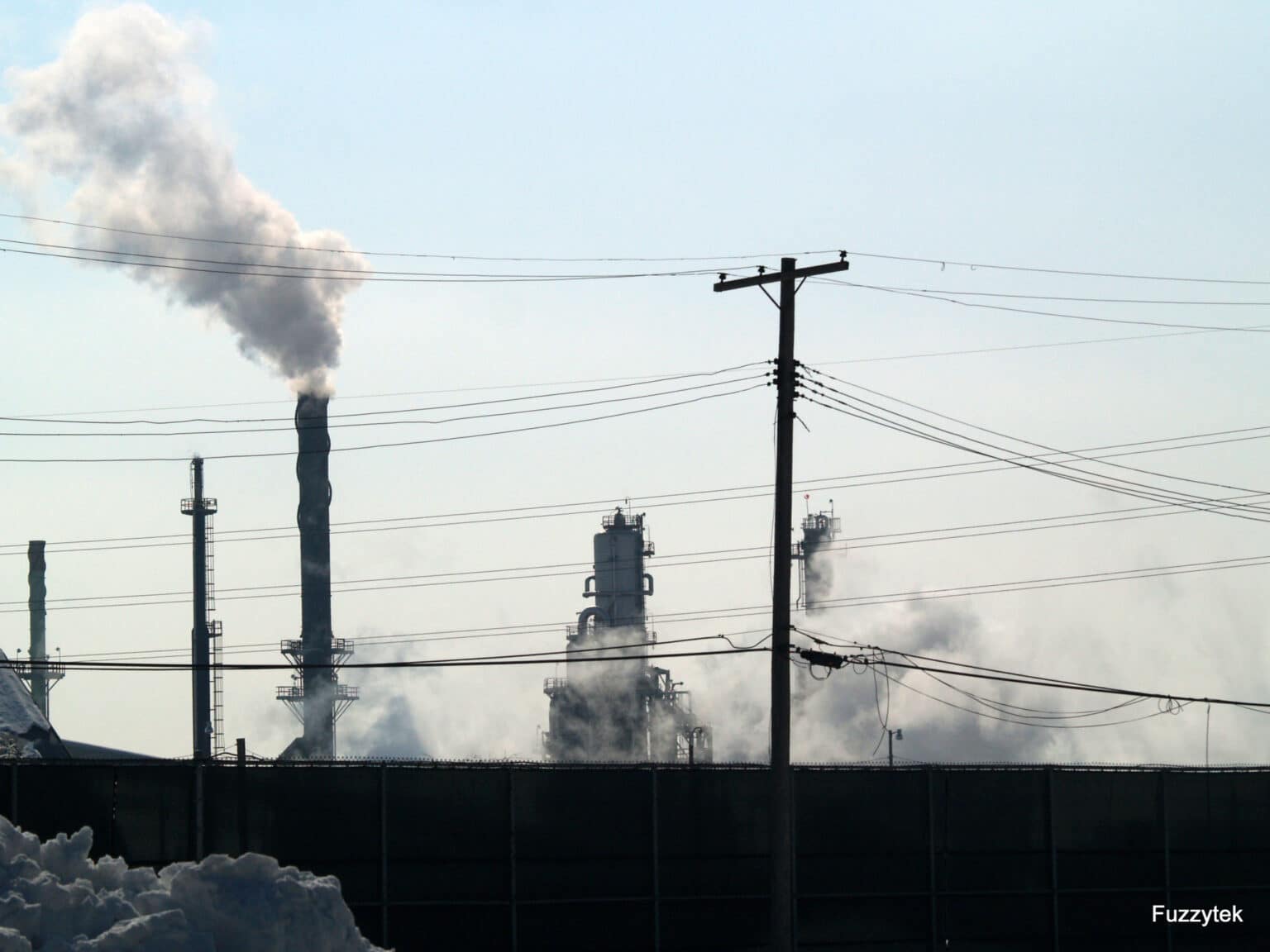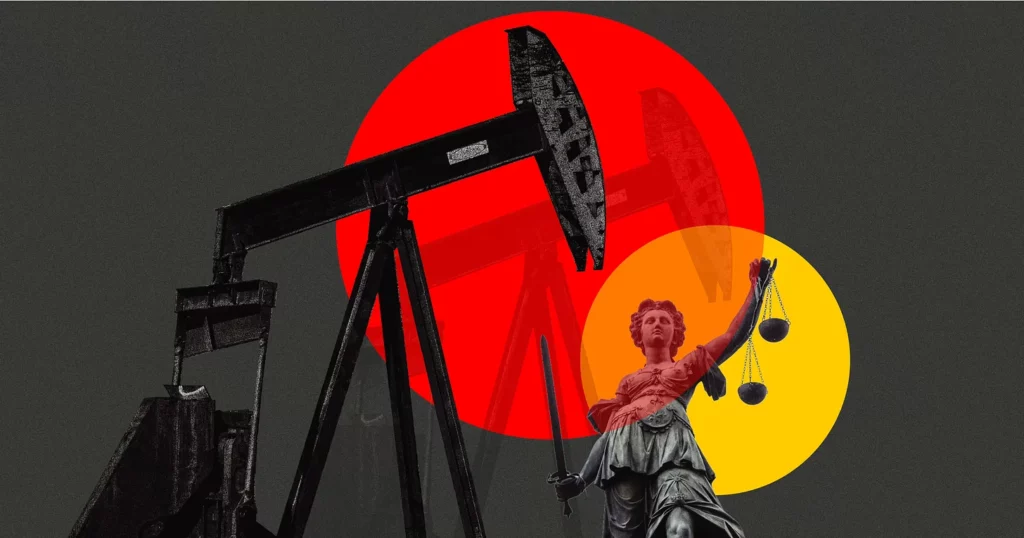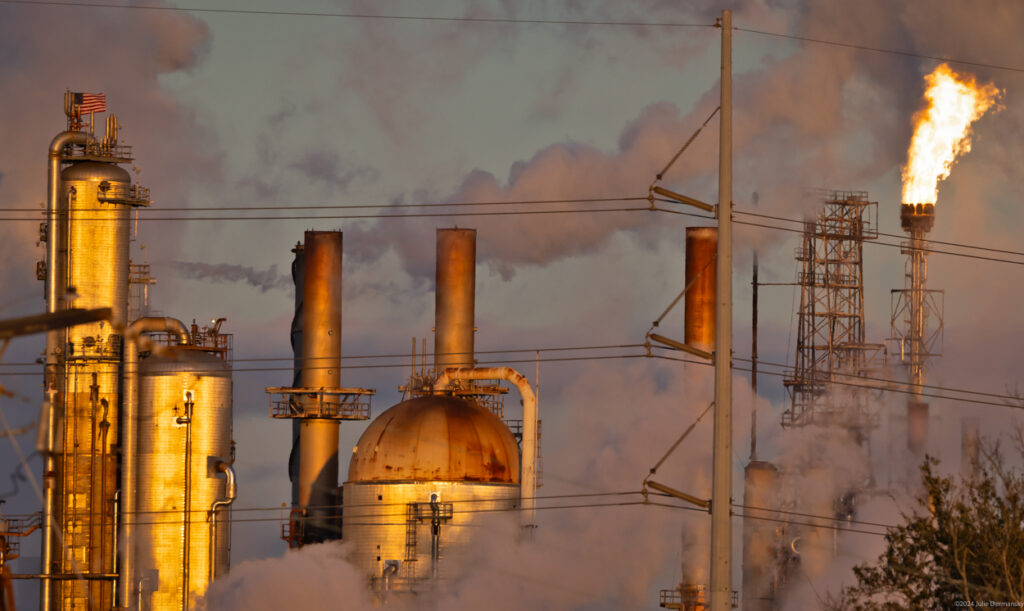A right-wing group that has a history of receiving funding from conservative foundations and ExxonMobil is trying to frame the state of Michigan’s attempts to shut down the aging Line 5 oil pipeline as an assault on the Black community.
That industry-backed spin has not gone down well with Michigan activists. “I think that’s B.S. I think it’s phoney baloney,” Theresa Landrum, a community activist in Detroit, told DeSmog. “The Black community is not benefiting. We have been suffering all along.”
Polluting industries are often located near Black, Brown, and Indigenous communities, impacting the health of communities suffering from long standing problems of disenfranchisement and disinvestment. At the same time, these communities are bearing the brunt of the climate crisis, hit hard by extreme heat, floods, and the breakdown of critical infrastructure. And Michigan is no exception, from Flint’s lead pipe crisis, to the urban neighborhoods of Detroit where people breathe toxic air on a daily basis.
Accelerating the shift away from fossil fuels addresses multiple problems at once by cutting carbon emissions while also reducing environmental and public health threats.
But the Washington D.C.-based Project 21 is trying to paint the continued-operation of a major oil pipeline as a crucial lifeline to the Black community in Michigan. In a November press release, the group warns against interrupting the flow of “life-sustaining fossil fuels.”
Tensions Over Aging Oil Pipeline
For decades, the Line 5 pipeline has carried oil and natural gas liquids beneath the Great Lakes from Superior, Wisconsin, through Michigan, and across the Canadian border to the petrochemical hub of Sarnia, Ontario.
In November 2020, Michigan Governor Gretchen Whitmer announced the revocation of a permit for the nearly 70-year-old project, requiring the shutdown of the pipeline over concerns that it could result in an environmental catastrophe. This effort to close the old pipeline has the backing of a long list of green, Indigenous, and environmental justice organizations. If the aging pipeline leaked or spilled, it would contaminate vital waterways, sources of drinking water, or fisheries, and harm the regional economy.
Enbridge, the pipeline’s owner, however, refused to close the conduit when the deadline arrived in May 2021, and has been essentially operating the pipeline without a permit ever since. The state of Michigan has since spent much of the past year seeking to enforce the shutdown of the Line 5 pipeline.
But recently, Project 21 has started trying to keep the pipeline alive by arguing that shutting it down would be the real injustice as communities of color would suffer most from such a decision.
In early November, the Biden administration was reportedly analyzing the market impacts of Line 5, although a White House spokesperson clarified that it was not considering shutting it down. Project 21 mischaracterized this news to portray the Biden administration as seeking the pipeline’s closure, while attempting to tie that to high gasoline prices and economic inflation more broadly.
If the pipeline were to be shut down, Project 21 alleges, the interruption of oil supply would cause energy prices to spike.
“The Biden Administration cannot say it supports environmental justice when it is preparing to effectively accelerate energy poverty,” Derrick Hollie, whose group Reaching America has worked extensively on campaigns supporting the positions of the oil and gas industry, said in a press release published on November 12 by Project 21. In 2019, Hollie made similar claims in testimony to Congress, pushing natural gas development while arguing that climate-friendly policies instead harm communities of color.
“Closing down the Line 5 pipeline will unduly affect Americans’ standard of living – especially those living in black communities who are already struggling to make ends meet,” said Project 21 “member” Emery McClendon in the press release.
Project 21 is an initiative by the National Center for Public Policy Research (NCPPR), a think tank that advocates for “private free market solutions to today’s environmental challenges.” NCPPR has received extensive funding from right-wing philanthropies like the Lynde and Harry Bradley Foundation, the now-defunct Carthage Foundation, and the Sarah Scaife Foundation. NCPPR has also received at least $445,000 from ExxonMobil since 1998.
Billed as the voice of Black conservatives, the stated mission of Project 21 is to “promote the views of African-Americans whose entrepreneurial spirit, dedication to family and commitment to individual responsibility have not traditionally been echoed by the nation’s civil rights establishment.”
The organization has a history of supporting deregulation, especially when it comes to the oil and gas industry. In 2018, Project 21 members supported the Trump administration’s decision to weaken fuel economy standards for cars and trucks, arguing that fuel economy standards increase “black hardship.” NCPPR also supported President Trump’s withdrawal from the Paris climate agreement.
Horace Cooper, a senior fellow at NCPPR and co-chairman of Project 21, formerly worked at the Heartland Institute, a notorious climate denying think tank. On November 15, Cooper participated in a press conference entitled: “‘Build Back Better’ Bad for Blacks,” a reference to the Build Back Better Act currently under negotiation in Congress that would provide universal pre-K, expanded healthcare and daycare, and funding for renewable energy, among many other programs. Project 21 says such programs would “elevate welfare over self-reliance and increase overall government control.”
Project 21’s press release about Line 5 was accompanied by a picture of a woman standing in the dark wearing a hat and scarf, an apparent attempt to link its warnings about the potential closure of Line 5 to a scenario in which Michiganders suffer in the dark without access to electricity.
But many of the group’s claims are misleading at best. A 2017 report commissioned by former Michigan Governor Rick Snyder found that a potential shutdown of Line 5 would only increase gasoline prices by a little more than 2 cents per gallon, a small amount compared to the larger and much more volatile swings in global energy markets that occur on a routine basis.
In addition, the importance of Line 5 to Michigan residents is overstated. More than 90 percent of the oil and gas flowing through Line 5 goes to Sarnia, Ontario, rather than Michigan, and the Great Lakes region has other pipelines that can move oil and gas around that could make up the loss of Line 5’s capacity.
Other potential concerns related to a shutdown of Line 5 are about the adequate delivery of propane for home heating, particularly in Michigan’s Upper Peninsula. Line 5 delivers propane to the region, but proposed upgraded rail and propane storage facilities, along with investments in renewable energy and energy efficiency, would ensure little disruption from a shutdown of the pipeline, according to Governor Whitmer’s “propane security plan.”
Black and Tribal Communities Push Back
More importantly, the claims that the pipeline’s shutdown, rather than its ongoing operation, present the real injustice, ring hollow for many in Michigan’s Black and Indigenous communities.
For years, Landrum and other community organizers have pressed state regulators to clean up the air and water in Detroit, with the large Marathon refinery a particular source of outrage. She wants Line 5 shut down because of the role it plays in supplying the refinery. Roughly 28 percent of the refinery’s oil comes from the long-distance pipeline.
“In my community, we have a high rate of cancer, asthma, and COPD,” Landrum said. “We have more than 42 major and minor polluting sources that are impacting our community and more are opening up every day.”
She took offense at Project 21’s claims that Line 5 is good for her and Michigan’s Black community.
Landrum questioned how many of the spokespersons for these Black-oriented conservative groups live in a frontline community. “They don’t even know what it’s like to live in the shadows of an oil refinery when you have an explosion,” Landrum said. “They don’t know what it is like to have pollution controls shut down during a blackout, and you don’t know if you should leave your home for safety or shelter in place, and no one is giving you any information.”
Regarding the officials of these groups, Landrum said, “They’re paid to comment. We’re not paid to comment. You have to follow the money. Money corrupts opinions. Money corrupts voices. We’re not sitting around drinking coffee in a suit and tie every day, being paid to say this crap.”
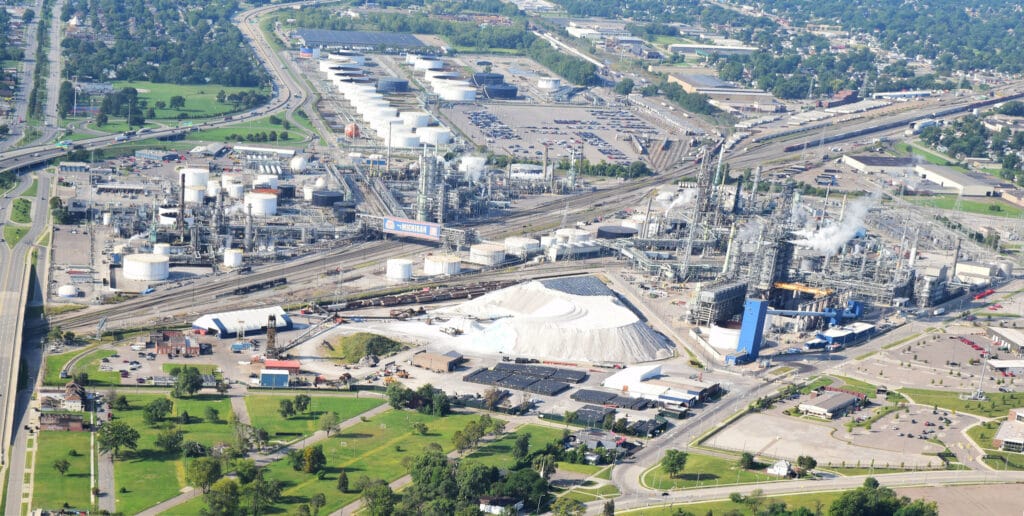
Meanwhile, tribal communities in Michigan want the pipeline closed due to the risk of a spill. Michigan’s 12 federally recognized tribes sent a letter to the Biden administration on November 4, calling on him to support the pipeline’s closure. “The Governor, the Attorney General, and our Tribal Nations need your Administration’s help,” the letter stated.
Tribal communities say that the pipeline’s existence, and the proposal to build a tunnel beneath the Straits of Mackinac that would hold a rebuilt section of the pipeline, present a historic and ongoing environmental injustice, threatening their way of life.
“Fishing is the lifeblood of the Bay Mills Indian Community — it is a cultural tradition that is essential for sustaining both the tribe’s food supply and its economy,” Christopher Clark, an attorney with Earthjustice, told DeSmog in an email. Earthjustice and the Native American Rights Fund are representing the Bay Mills Indian Community against Line 5. “The existing pipeline and proposed tunnel replacement will perpetuate the risks of an oil spill to the Tribe’s treaty-protected waters, fish, plants, and cultural resources, and will significantly exacerbate climate change.”
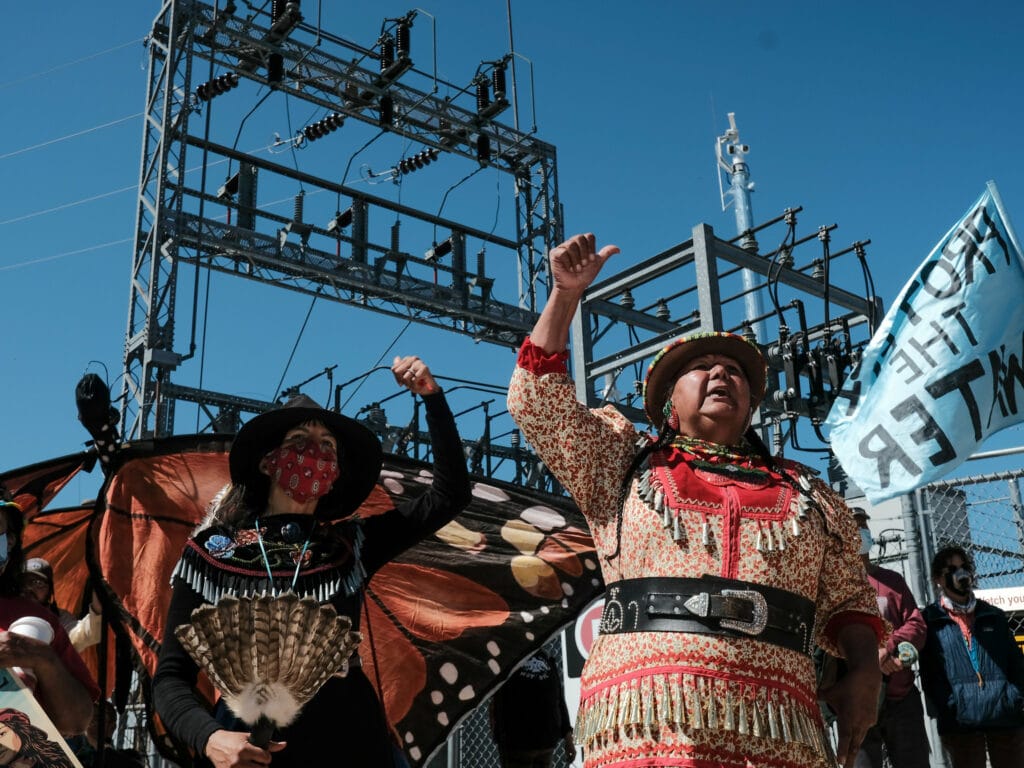

The potential for higher energy costs if Line 5 were shut down, a framing promoted by Project 21 and other industry-backed groups, is also misleading. Environmental justice activists and scholars argue that an equitable transition to clean energy could improve access to energy, while lowering costs and reducing pollution.
“That’s a ridiculous argument. Household energy costs are based on a lot more factors than whether or not a pipeline is operating,” Kyle Whyte, a professor of environment and sustainability at the University of Michigan, and an enrolled member of the Citizen Potawatomi Nation, told DeSmog. “They’re based on how investor-owned utilities operate, to the efficiency of homes in communities that are disenfranchised. The energy ecosystem is much more complex than a single pipeline.”
Even if the claims that Michigan couldn’t live without Line 5 were true, Whyte added, that would only bolster the case for change. “If our economy is in a situation where we’re that dependent on a pipeline, we need a different scenario,” he said. “Line 5 continues this dirty economy. Right now, Native people, Black and Brown communities, we’re trying to get out of the dirty economy. We’re not trying to sustain it.”
More broadly, he took issue with attempts by industry allies to use an environmental justice framing as a reason to bolster the profile of Line 5. “Environmental justice is not just about what Enbridge says is good for the economy, or what their advocates say,” Whyte said. “It’s about what Native people, Black and Brown people, say is safe enough based on our cultures and our understanding and our visions.”
Project 21 and NCPPR did not respond to multiple requests for comment from DeSmog.
The spin aimed at bolstering the importance of Line 5 mirrors a broader public relations campaign pushed by the oil industry, trade groups, and Republican politicians in Michigan — one that echoes misleading claims from Enbridge about the importance of keeping Line 5 operating to avoid higher gas prices and fuel shortages.
The framing from Project 21 that shutting down Line 5 would impose disproportionate hardship on communities of color is an intentional strategy to “divide and conquer,” according to Megan Hess, the rural organizing director for We the People, a Michigan nonprofit.
“Why is the energy industry interested in driving a wedge between Black leaders and the Indigenous community?” Hess said in an email to DeSmog. “Keeping our communities apart ensures they can keep one of the riskiest pipelines open and pumping profits for themselves while we assume all the risk.”
Subscribe to our newsletter
Stay up to date with DeSmog news and alerts


